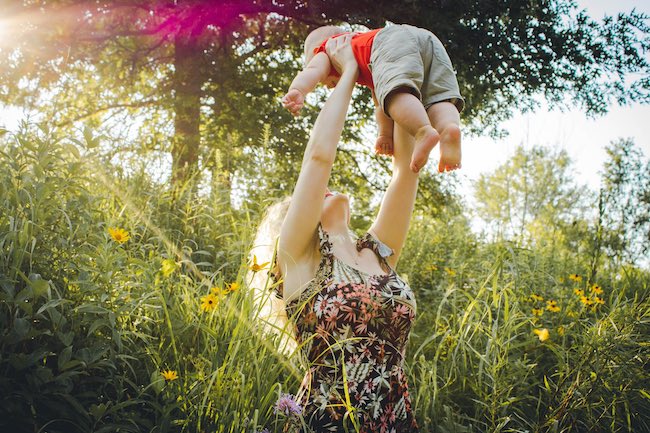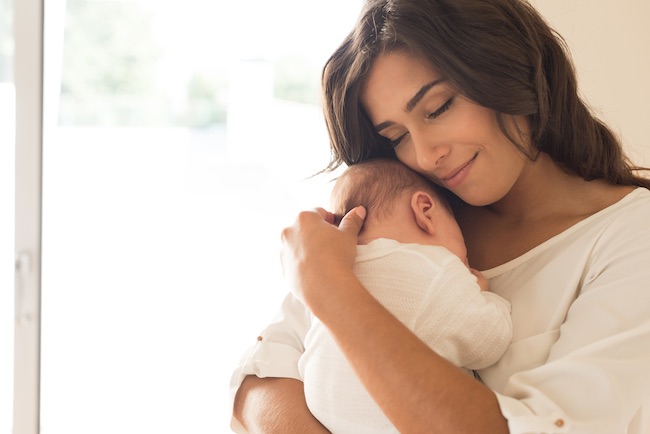
Images in the media have many women convinced they can get their bodies back to their pre-pregnancy size right away, the truth is, 60% of women still carry extra weight for one or two years after their baby is born. Carrying and giving birth to a child are complex biological processes; hormones like progesterone and HCG rise, blood volume increases, the uterus expands and the body gains weight. Pregnancy is one of the many miraculous and powerful things your body can do, and adapting a positive self-image and adjusting to physical changes is vital for a healthy pregnancy and preventing postpartum depression. Knowing what to expect and accepting yourself as you are can make postpartum life much easier.
Don’t Expect to Lose The Weight Right Away
During pregnancy, women who have an average BMI are expected to gain between 25 and 35 pounds. Women who are underweight or overweight may need to gain more or less, and if you are carrying multiples you can expect to gain extra weight as well. Of course, babies usually only weigh an average of 7.5 pounds, so what accounts for the rest of your weight gain? Increased fat stores, breast tissue, amniotic fluid, placenta, blood volume, and uterus size make up for the rest of the weight you’ll gain during your pregnancy, and these pounds will not necessarily come off as soon as your baby is born. Your body retains extra weight to make breastfeeding possible, and it takes time for the uterus to contract and for fluids to leave the body.

In the weeks following childbirth, you’ll begin to gradually lose more weight, and many women who breastfeed report losing weight faster, however, it is not uncommon to struggle losing the last few pounds, especially if you gained more than the recommended amount of weight during your pregnancy. After a six week period, your OB-GYNE may give you the clear to begin exercising again, but until then, it’s important to take it easy on your body. If you’re struggling to lose pregnancy weight, talk to your doctor about diet and exercise plans that can help you achieve your goals. Weight gain can also occur as part of the natural aging process, as muscle mass decreases and your metabolism slow down.
Skin Changes During Pregnancy are Common
As your body expands to accommodate your growing baby, your skin may stretch, leaving you with marks on your belly and elsewhere. Almost 90% of pregnant women experience stretch marks and while they may fade over time, stretch marks won’t usually disappear on their own. Moisturizing, eating vitamin-rich foods and exercising can help skin maintain its elasticity and prevent or minimize stretch marks. You can speak with a dermatologist after you give birth to talk about treatment with Retin-A or laser therapy if you’re bothered by the appearance of stretch marks, but remember, for most women, stretch marks are a normal part of the postpartum body.
Your Breasts May Change in Size and Shape
During pregnancy, many women find their breasts increase in size, and the nipples may appear darker and larger, due to a combination of factors such as hormones, weight gain, and increased blood volume. Before your baby is born, your breasts begin to produce colostrum, which is the first stage of lactation. A few days after you have your baby, your milk will come in, causing your breasts to become engorged until you pump or breastfeed. If you choose not to breastfeed, or after you’ve weaned your baby, you may notice that your breasts won’t return to their pre-pregnancy size and shape. Fluctuations in the density of breast tissue throughout your pregnancy may cause a loss of elasticity, causing breasts to appear smaller and saggier. Some women find their breasts remain larger after pregnancy and breastfeeding, and in other cases, women report no change at all.

Pregnancy is a journey that can change the topography of your body, but it’s important to be proud of what you’ve accomplished and look at the changes in your body as evidence of a job well done. Everybody is unique, and you may find yourself facing unexpected changes in the months and years after your baby is born. If you’re experiencing challenges accepting your postpartum body, seek support and don’t be afraid to talk to a mental health professional.
Jane has been a freelance writer and editor for many years and her passion is to use her work to help people improve their everyday health and well being. Jane also loves music and travel, but above all her greatest love is simply spending time with her family.
Leave a Reply